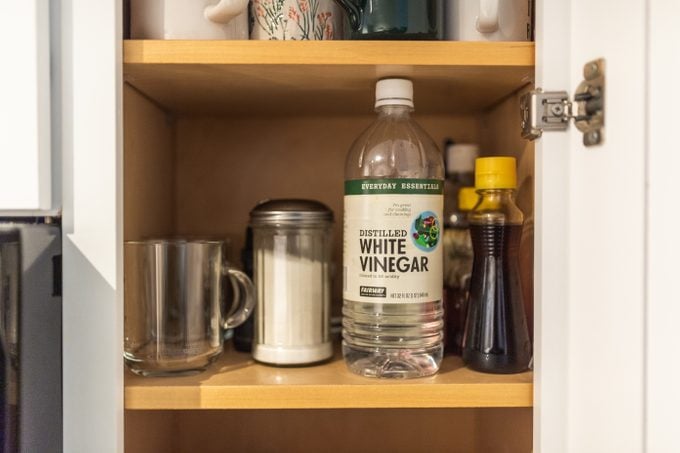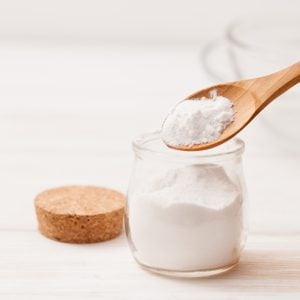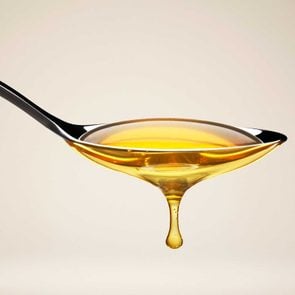6 Healthy Vinegar Uses That Put Apple Cider Vinegar to Shame
Updated: Feb. 29, 2024
These vinegar uses give apple cider vinegar a run for its money. Here's how you could use it and what you need to know.
The underestimated vinegar
Apple cider vinegar is touted for its various health benefits, but people may forget that other types of vinegar can offer perks, too. For instance, white vinegar can be good for your body as well.
Here are some of the benefits (and risks) of using white vinegar for consumption, cooking, cleaning and disinfection.
Get The Healthy @Reader’s Digest newsletter
What is white vinegar?
White vinegar, or distilled white vinegar, is a clear solution of acetic acid and water. The earliest known use of vinegar dates to more than 10,000 years ago.
In general, vinegar is made with a two-step process of fermentation.
First, yeast ferments the sugars or carbohydrates in foods like potatoes, grains, or fruit and converts them to alcohol. Then, acetic acid bacteria (Acetobacter) converts the alcohol to acetic acid during the fermentation process.
Most white vinegar is made by the fermentation of grain alcohol, or ethanol.
The result is diluted into a solution that is sold in just about any store for general all-purpose use like cleaning, and even cooking.
But not all vinegar is created equal. The difference between cleaning vinegar and distilled white vinegar is their level of acidity.
White vinegar has 5% acidity, and cleaning vinegar has 6% Although it’s only a one percent difference, cleaning vinegar is much stronger white vinegar—20% stronger—and is not intended for consumption.
Another clue is that you can also find the distilled white vinegar in the condiment aisle, but the cleaning vinegar will be with other cleaners in general stores.
Although it’s OK to use distilled white vinegar for cleaning, the same isn’t true for using cleaning vinegar in recipes. Remember, that extra acidity means it is not safe for consumption.
Home Cleaning Tips Straight From the CDC
White vinegar vs. apple cider vinegar
Other than their color, there are a few differences between white and apple cider vinegar.
Apple cider is contains anywhere from 5-6% acetic acid. It comes from crushed, fermented apples.
White vinegar, however, contains 4-7% acetic acid and is from the fermentation of grain alcohol.
Can You Drink Apple Cider Vinegar While Fasting?

Healthy vinegar uses to try
Although there’s arguably a bit more research on apple cider vinegar, there are plenty of uses for white vinegar, too. Here’s what the current, limited research says about the health benefits and uses of vinegar.
Promote weight loss
A 2015 review in the Journal of the Academy of Nutrition and Dietetics suggests that weight loss might be a secondary effect of consuming vinegar. While the evidence is mixed as to the benefits for people with diabetes, it’s safe when used in reasonable amounts to flavor food, according to the report.
Vinegar consumption could increase fullness by slowing the rate at which the stomach empties, leading to reduced calorie intake.
In one study in Bioscience, Biotechnology, and Biochemistry, people who were overweight consumed vinegar over a 12-week period. They found that the people who consumed a beverage containing either one or two tablespoons of vinegar had slightly lower body weight, BMI, visceral fat area, waist circumference, and serum triglyceride levels at the end of the study than those who consumed the same drink without the added vinegar. (They drank half of it at breakfast, and the rest at dinner.)
The difference was about 2 to 4 pounds and 0.4 to 0.7 BMI points between the groups, according to the report.
While there are potential weight management benefits to white vinegar, studies are limited, conflicting, and mostly animal-based. Because of this, more research is needed, according to Malina Malkani, a registered dietitian nutritionist and author.
“However, if it’s an ingredient people enjoy, including vinegar in moderation in meals and snacks is a great way to incorporate it into the diet while possibly reaping some of the potential health benefits,” she says.
Eating More of This Can Improve Your Gut Health, Says New Science
Help control blood sugar
Malkani notes that the same is true of the research on blood sugar and vinegar.
One meta-analysis (a combination of studies) in Diabetes Research and Clinical Practice looked at the effect of vinegar intake on post-meal glucose response. They found that those who consumed vinegar compared to those who did not had lower blood sugar and glucose, which suggests it might be a tool for improving glycemic control or managing diabetes.
This is likely because of the acetic acid in vinegars, according to a 2016 paper in Comprehensive Reviews in Food Science and Food Safety. The acid regulates the concentration of blood glucose by improving insulin sensitivity and promoting glycogen production.
In a small study of eight men with pre-diabetes in the European Journal of Clinical Nutrition, the researchers found that vinegar ingestion before a meal also had a positive impact on insulin resistance, although it didn’t seem to lower blood sugar.
Here’s How Long You Need to Walk to Lower Your Blood Sugar, New Research Finds
In the study, the men consumed about three tablespoons of a vinegar and water mixture or the same amount of plain water directly before eating a meal.
In a report in the Journal of Diabetes and Endocrinology, researchers looked at 60 people with type 2 diabetes. Half of the people added about a tablespoon of white vinegar to their middle meal each day for a month while the other half added water as a placebo.
Those taking vinegar saw a decrease in fasting blood sugar and lowered HbA1c, an indicator of blood glucose.
9 Surprising Foods That Can Wreak Havoc on Your Blood Sugar
Treat wounds and sores
Vinegar contains antimicrobial properties, meaning it’s great for treating everything from nail fungus and warts to skin infections, according to reports in the Journal of Infection and Public Health and PLoS One.
For example, a one-to-one mixture of white vinegar and rubbing alcohol can be used as a treatment for swimmer’s ear, an infection of the outer ear, according to an American Academy of Pediatrics news report.
One small study of 100 people in the Indian Journal of Plastic Surgery suggests that a one percent acetic acid solution (vinegar) may accelerate wound healing because of its ability to combat a wide range of bacteria and fungi.
What Kills Bacteria and Viruses—And What Doesn’t
Disinfect
Research in the Journal of Applied Microbiology found that a cleaning solution of tea tree oil, club soda, and vinegar is better at cleaning ceramics than bleach.
You can even use vinegar as part of an alternative toothbrush cleaning solution, too.
A study in Scientific World Journal looked at two-hundred eighty toothbrushes to find out the best disinfectants. The researchers found that white vinegar was best at killing Streptococcus mutans bacteria, a cause of tooth decay. (The toothbrush goes in the solution; it is not for drinking or swishing in the mouth).
And an article in the World Journal of Dentistry suggests using a combination of white vinegar and table salt to swish your toothbrush in before letting it air dry.
Note that you should not brush your teeth with this solution, but rather just use it to cleanse your brush. The strong acidity level may damage tooth enamel. (More on this below)
Here’s Why Your Stress Is Ruining Your Dental Health, Says a Dentist
Clean produce
“White vinegar works well as a cleaning agent for fruits and vegetables because of its ability to inhibit food-borne pathogens,” Malkani says. “Produce can be spritzed with a vinegar and water solution, then rinsed with water before eating.”
The ideal ratio is one part vinegar to four cups of water.
This Is the Best Way to Clean Pesticides Off Your Fruit, According to Science
Cook and pickle
Malkani says that you can also use white vinegar as an ingredient for salad dressings, sauces, and marinades. And adding it to a marinade helps tenderize meat.
“It provides a bright flavor and the perception of a salty taste which can help facilitate lower sodium meals, as it contains no sodium and negligible calories,” she says.
Some people like to use vinegar with pickling seasonings and water to pickle vegetables and fruits, or along with baking soda in baked goods as a leavening agent, Malkani adds.
Other fun ways to cook with white vinegar are:
- Adding a tablespoon to a cup of milk as a quick buttermilk alternative.
- Add a splash of vinegar to simmering water when poaching eggs, so the whites don’t separate.
- You can even add a teaspoon to rice cooking water for fluffier rice.
Vinegar can harm tooth enamel and has other risks
Make sure to dilute the vinegar if you are drinking it instead of cooking with it.
When highly acidic liquids like white vinegar are consumed often, and especially when they are sipped frequently or swished in the mouth, they can lead to tooth erosion, according to Malkani.
“When consumed frequently and in large volumes, white vinegar may also cause inflammation, irritation, and damage to the mouth, throat, and digestive system as a result of its high acidity, so moderation is key,” she says.
The best way to consume white vinegar is as an add-on or ingredient for pickling or baked goods. A little goes a long way.
Other research in the Journal of the Academy of Nutrition and Dietetics suggests potential adverse effects, like low blood sugar and low potassium levels, when certain blood sugar and heart medications are supplemented with vinegar.
If you are dealing with health issues like diabetes, the bottom line is to consider these vinegar uses as supplemental—not first-line defenses. And always speak with a health care professional before adding supplements to your diet.
For more wellness updates, follow The Healthy on Facebook, Instagram, and Twitter. Keep reading:



